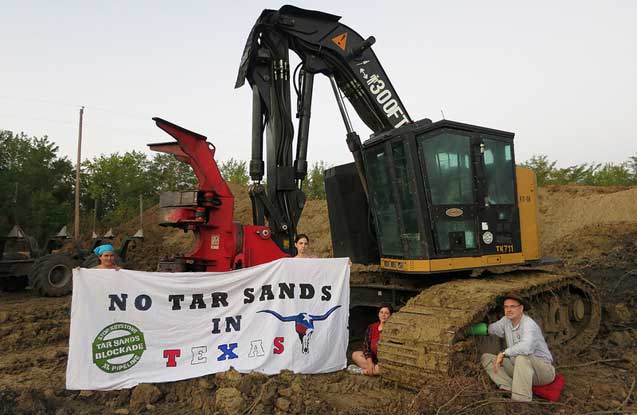
Part of the Series
Planet or Profit
Those meddling blockaders are at it again.
Three environmental activists locked themselves to a TransCanada feller buncher last week in Saltillo, Texas, stalling the project as construction workers and police abandoned the site for the day.
A feller buncher is used in construction and logging to rip trees from their roots — in this case to clear a path for the Keystone XL pipeline. Two other activists with the Tar Sands Blockade stayed at the site to provide support to those who were locked down.
Unlike a similar action the week before in Livingston, Texas, there were no arrests at the September 5 Saltillo protest, which ended when Blockade protesters unlocked themselves and declared victory for a full day of climate justice.
Activist Michael Lowe tells Truthout he participated in the lockdown to protect Native water rights. The Keystone XL threatens ground water supplies across the pipeline route, and many Indigenous communities will be directly affected if there is a leak or spill along the pipeline, he says.
“I’ve stayed on a lot of Native lands during my travels and became really close with their communities. We went to a lot of their community meetings where they were talking about how they would not have water rights for the next 10 years. It just made me think, ‘What is a more basic right than water?'”
The action comes a week after seven blockaders were arrested in a lockdown action in Livingston which successfully shut down Keystone XL construction on August 28.
The Tar Sands Blockade is coordinating a series of rolling protests along the proposed southern route through Texas and Oklahoma.
The day blockaders were locked down in Saltillo, TransCanada announced a proposed new pipeline route in Nebraska that would avoid the ecologically sensitive Sandhills region in an attempt to assuage the concerns of local ranchers and environmental advocates.
The Sandhills sit atop one of the most important agricultural aquifers in the nation.
The broad-based public outcry over the Sandhills region in Nebraska — both from Republican politicians and grassroots activists — as well as an arbitrarily rushed deadline for an environmental review, were cited as major reasons President Obama in January rejected the permit for the cross-border portion of the pipeline.
“Based on feedback from the Nebraska Department of Environmental Quality and the public, we have refined our proposed routing of the Keystone XL pipeline,” TransCanada’s president, Russ Girling told the Los Angeles Times. “The preferred alternative route … reflects our shared desire to minimize the disturbance of land and sensitive resources in the state.”
Pipeline opponents maintain that no matter what route the pipeline takes, the toxic tar sands slurry it carries will devastate any land it touches and any water body it sinks into.
Further, no matter its route, hundreds of thousands of acres of Boreal forest will be cleared. The pipeline itself could spell “game over” for the climate, as National Aeronautics and Space Administration climatologist James Hansen suggested in a scathing New York Times opinion piece earlier this year.
Does TransCanada really think that 1,200 people were arrested in front of the White House — and another 12,000 who encircled it — just to protest the pipeline’s route?
“I’ve realized that the traditional means to effect change, while still useful, can only go so far, and not far enough,” says Occupy Dallas member Gary Stuard who locked down Wednesday. “It is completely clear to me now that massive nonviolent, direct action is really the only way to protect the rights of citizens, to protect our land, water, air — and to prevent ecological catastrophe from happening.”
Stuard told Truthout that he is thrilled to be a part of the burgeoning Summer of Solidarity movement. Stuard says a long spiritual and philosophical journey gave him the strength to lock down. He was a Zen Buddhist monk for more than four years.
“I was brought up in an evangelical fundamentalist congregation. As a gay person, that did some serious damage to me psychologically. At the same time, being exposed to the life and example of Jesus of Nazareth made a very powerful and deep impression on me,” he says. “I’m no longer religiously affiliated, but I still live by the above principles.”
In Texas and Nebraska, conservative ranchers and landowners, as well as Republicans, are joining hands with the likes of environmentalists and occupiers to oppose the Keystone XL pipeline, no matter what path it takes.
If the Blockade movement reaches its goal, the pipeline won’t take any route at all.
Full disclosure: Candice Bernd was formerly affiliated with the Tar Sands Blockade.
Join us in defending the truth before it’s too late
The future of independent journalism is uncertain, and the consequences of losing it are too grave to ignore. To ensure Truthout remains safe, strong, and free, we need to raise $46,000 in the next 7 days. Every dollar raised goes directly toward the costs of producing news you can trust.
Please give what you can — because by supporting us with a tax-deductible donation, you’re not just preserving a source of news, you’re helping to safeguard what’s left of our democracy.